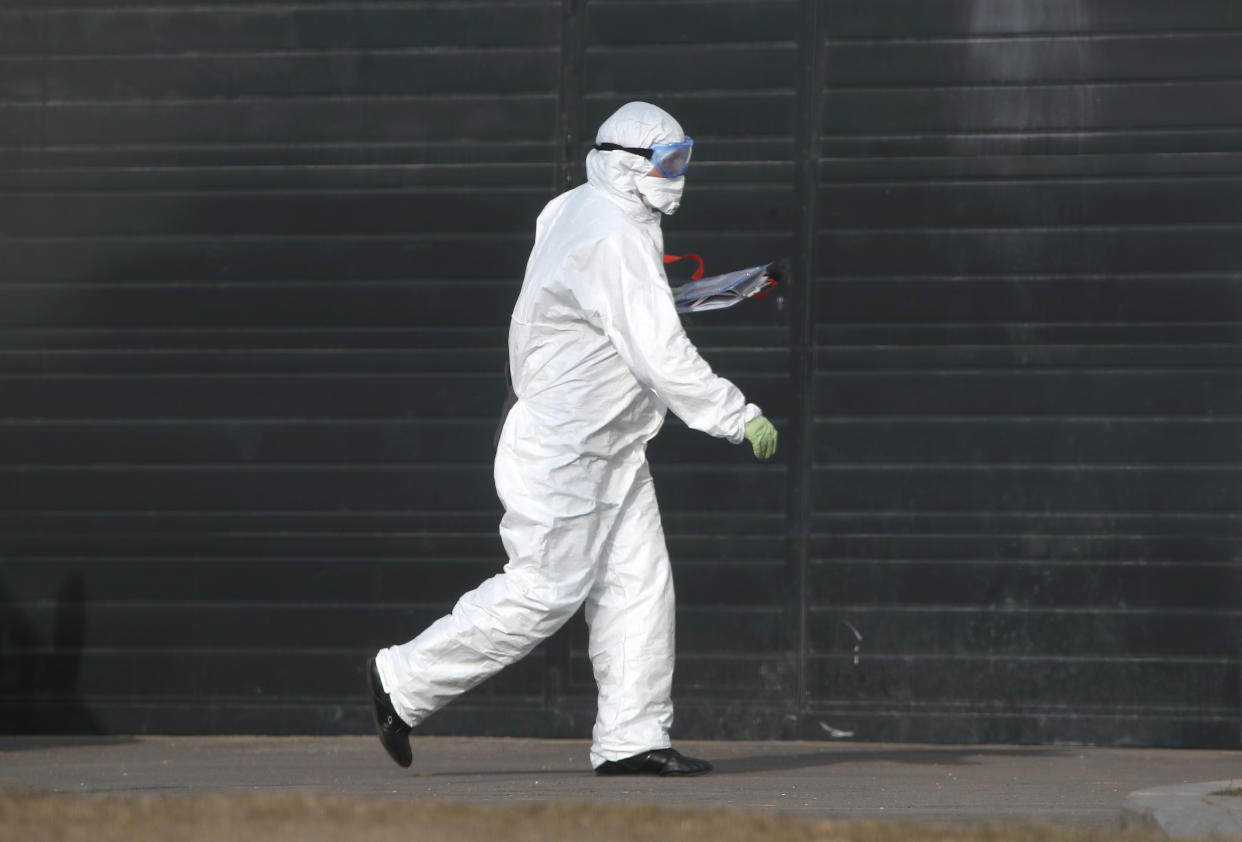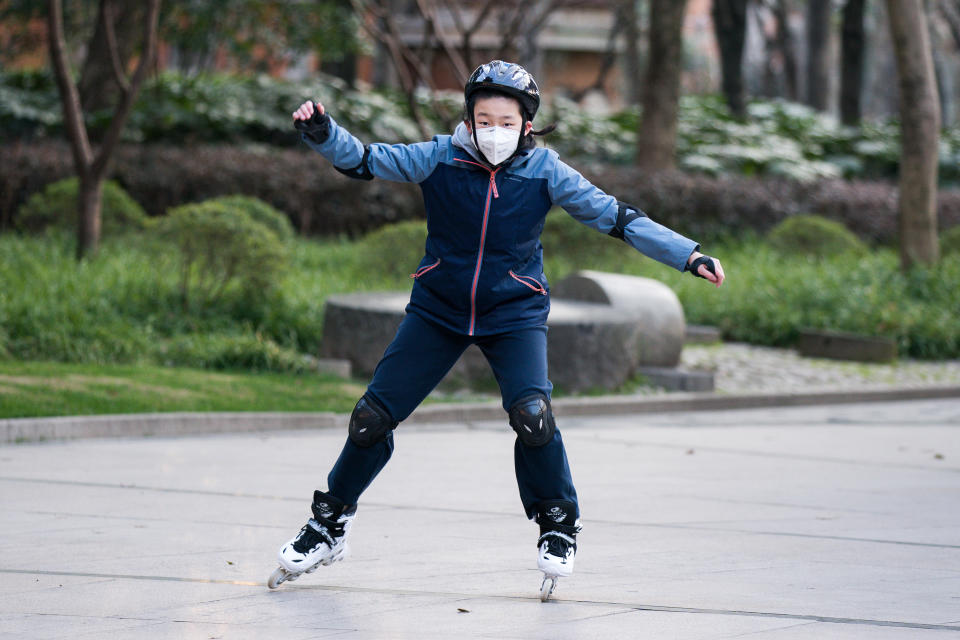England's chief medical officer expects the coronavirus to ‘peak’ in ‘two-to-three months’

England’s chief medical officer expects the coronavirus outbreak to “peak” in “two-to-three months”.
Professor Chris Whitty added it could then take “a further two-to-three months for the virus to decline” in the UK.
Read more: Coronavirus 'could spread in faeces and urine'
Addressing the Commons’ Health and Social Care Committee on Thursday, Professor Whitty added the government hopes to delay the outbreak’s peak until late spring or summer, easing “winter pressures on the NHS in all four nations of the UK”.
Winter is already a strained time for the health service while it contends with seasonal flu.

The new coronavirus strain Covid-19 emerged at a seafood and live animal market in the Chinese city Wuhan at the end of last year.
It has since spread globally, crossing national borders into at least 60 countries, with more than 95,700 confirmed cases.
Mainland China still has the bulk of the incidences, with over 80,400 patients.
Data suggests, however, cases are plateauing in the outbreak’s epicentre.
On 3 February, 80,200 patients had been identified in China, rising to 80,300 the following day and 80,400 on 5 February.
Read more: Coronavirus death rate higher than previously thought, World Health Organization says
South Korea has the most cases outside of China, with more than 6,000 incidences and 35 deaths.
It is followed by Italy, with over 3,000 patients and 107 fatalities.
Out of at least 13,000 tests, 90 have come back positive in the UK.
One British man died after catching the coronavirus aboard the quarantined “hotbed” Diamond Princess cruise ship.
Globally, the death toll has exceeded 3,000.
While the outbreak can feel alarming, research suggests four out of five cases are mild, while more than 53,400 patients have “recovered”.
When could the coronavirus Covid-19 ‘peak’ in the UK?
Professor Whitty is optimistic the worst could be over in the UK in two-to-three months.
Scientists have previously praised interventions in Wuhan and the rest of China for managing to make cases plateau.
Wuhan – with is 11 million residents – has effectively been in “lockdown” since early in the year, with planes, trains, buses, subways and ferries all suspended.
Everything from libraries and museums to theatres and coffee bars “shut up shop”, while workers were told not to come into the office.
Growing awareness of the outbreak may have also allowed patients to spot the tell-tale symptoms and “self isolate”.
Covid-19 generally causes flu-like fever, cough and breathlessness.
In severe cases, patients develop pneumonia.
The UK is also “cracking down”.
England’s Six Nations game against Italy, scheduled for 14 and 15 March, has been postponed to a “later date”.
Staff have also pulled out of the prestigious dog show Crufts.
Although it is unclear what Professor Whitty’s “peak” comment was based on, some experts are cautiously optimistic.
“I am not party to the actual calculations behind this, but it is likely based on modelling projections,” Professor Kao Rowland from the University of Edinburgh told Yahoo UK.
“It doesn’t sound unreasonable and it may rely in part on the consideration of seasonal effects which are often seen in respiratory infections, though the exact reasons for this are only partially understood.”
Read more: Could the coronavirus spread on public transport?
Experts have wondered whether the coronavirus may become a seasonal infection that eases in the northern hemisphere’s warm summer months before re-emerging in winter.
This was seen with fellow coronavirus severe acute respiratory syndrome (Sars), which killed 774 people during its 2002/3 outbreak. No cases have been reported since.
Although unclear why this occurred, low temperatures and a lack of sunlight is thought to slow the rate the norovirus (winter vomiting bug) breaks down.
Infections may also be more common during the cold winter months as people huddle together indoors.
“[As the outbreak progresses] models with projections will begin to have increasingly better estimates of disease incubation periods, rates of transmission in different countries and estimates of the effectiveness of control efforts already in place in various countries,” said Professor Rowland.
“Remember control efforts will likely reduce rates of spread even if they don’t completely stop it and, in combination with other factors, could cause a slow down in that timeframe.”
Professor Paul Hunter, from the University of East Anglia, added it is “plausible” warm weather could ward off the coronavirus, but “we will have to wait and see”.
Speaking of Professor Whitty’s comment, Professor Hunter said: “This is a reasonable assumption but whether or not it will turn out to be the case we will have to wait and see.
“There are a number of issues that could delay the peak such as the effectiveness of delaying strategies and even the changing seasons.
“It is plausible spring and summer could delay the peak until next winter, but we really do not have enough information to be sure.
“Having said that, Professor Witty’s assessment is certainly the safest with currently available knowledge.”
Professor Devi Sridhar, also from the University of Edinburgh, added she was “unsure” what Professor Whitty’s comment may be based on.
“My guess would be from influenza and previous influenza outbreaks,” she told Yahoo UK.

What is the coronavirus Covid-19?
Covid-19 is one of seven strains of the coronavirus class that are known to infect humans.
Others include the common cold and Middle East respiratory syndrome (Mers), which killed 858 people during its 2012 outbreak.
Most of those who initially caught Covid-19 worked at, or visited, the “wet market” in Wuhan.
The main method of transmission is thought to be face-to-face via infected droplets coughed or sneezed out by a patient.
In severe cases, pneumonia can come about when the infection causes the alveoli (air sacs) in the lungs to become inflamed and filled with fluid or pus.
The lungs then struggle to draw in air, resulting in reduced oxygen in the bloodstream.
“Without treatment the end is inevitable,” said the charity Médecins Sans Frontières.
“Deaths occurs because of asphyxiation.”
Covid-19 is thought to have started in bats before “jumping” into humans, possibly via snakes or pangolins.
There is no specific treatment, with care being “supportive” while a patient’s immune system works to fight off the infection.
Officials recommend regular hand washing and “social distancing” to stem Covid-19’s transmission.



